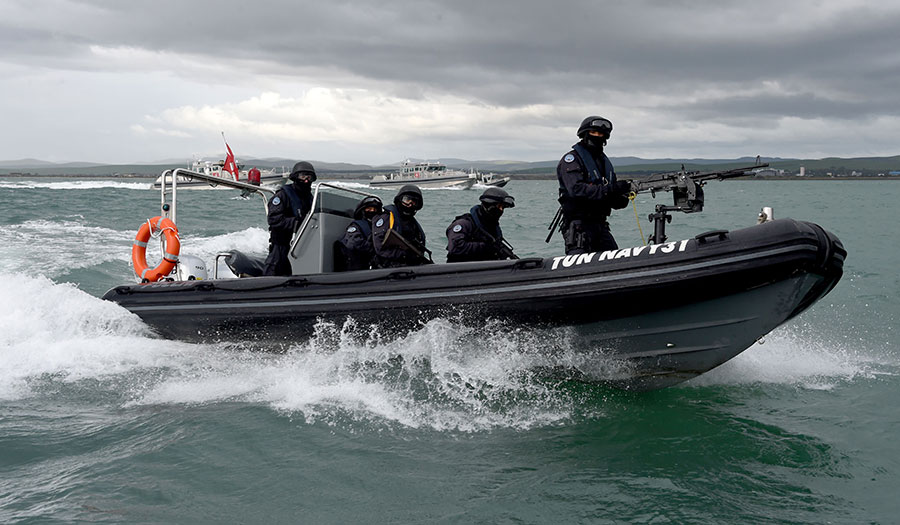 Fethi Belaid/AFP/Getty Images
Fethi Belaid/AFP/Getty Images
Article
With thousands of troops stationed on the continent, America is waging a war there that is primarily unknown, but still very deadly.
Learn the why behind the headlines.
Subscribe to the Real Truth for FREE news and analysis.
Subscribe NowAfter four American Army Green Berets were killed in early October in Niger when their convoy was ambushed by terrorists, U.S. citizens were in shock. Yet it was less from the deaths themselves than the place where they were killed.
“Where is Niger?” people asked. “And why are American forces even in the country of 20 million when we are not at war there?”
It is a question that has more relevance now that the West African nation’s plight is in the spotlight.
On the Ground
The soldiers killed in Niger were four of the roughly 800 U.S. service members there who are part of a French-led mission to defeat extremists in West Africa.
The joint U.S. and Niger patrol had been asked to help a second team of commandos hunting for a senior member of al-Qaida in the Islamic Maghreb. A senior defense official said the ambushed team had asked to go to a location where the insurgent had last been seen to collect intelligence, but not search for him.
After conducting an overnight reconnaissance mission, the Army Green Berets and about 30 Nigerien troops stopped briefly in a village to get food and water. Upon leaving, they were attacked by about 50 heavily armed enemy fighters, who also killed four Nigerien fighters and wounded two Americans and several Nigeriens.
The troops were just a handful of thousands who have been deployed across the continent to deal with an increasing number of threats from Islamic terrorist groups, political instability, and tribal clashes.
“It’s a fight that takes place largely in the shadows, led by small teams of US special operations forces,” Vox reported. “In Somalia, Navy SEALs are hunting members of al-Qaeda and ISIS-linked militants from groups like al-Shabaab (one of the commandos died in a botched raid earlier this year). In Libya, they’re carrying out counterterror missions like the one that captured Ahmed Abu Khattala, a militant linked to the deadly assault on the American diplomatic compound in Benghazi. And in Djibouti, the US flies armed drones out of a major airbase at Camp Lemonnier, which is also used for counterterrorism and counter-piracy operations in the region.”
In many cases, U.S. troops are fighting in countries they did not expect to be in against an enemy—Islamic State affiliates—that did not exist years ago.
“At the moment, seventeen hundred members of the Special Forces and other military personnel are undertaking ninety-six missions in twenty-one countries, and the details of most are unknown to Americans,” The New Yorker reported.
“The missions rely on a broad array of legal authorities but have one particularly important thing in common: They have never been specifically authorized by Congress, let alone discussed and debated by the American public,” Vox stated. “Huge questions exist as to the strategic importance and relevance of all these missions, and whether they improve US national security enough to justify the high cost in blood and treasure. Since 2001, at least 36 soldiers have died conducting or supporting military operations in Africa, including Sgt. La David Johnson and the three others killed in Niger earlier this month.
“With 6,000 troops operating in Africa, and US commanders describing the continent as the next big battleground in the terror fight, the pace and number of American military engagements is certain to increase even more sharply. That raises legitimate new questions about whether the US has committed itself to unending and expanding war in Africa through missions that are taking place with nearly no political or public oversight.”
Increasing Missions
Virginian Democrat Senator Tim Kaine told The Associated Press that most Americans would be surprised by the extent of operations in Africa in which U.S. forces are involved.
“I don’t think Congress has necessarily been completely kept up to date and the American public, I think, certainly has not,” Mr. Kaine told the outlet after leaving a classified briefing conducted by senior Pentagon officials on the assault in Niger.
And the number of missions appears to be growing.
According to Vice News: “In 2006, just 1 percent of all U.S. commandos deployed overseas were in Africa. In 2010, it was 3 percent. By 2016, that number had jumped to more than 17 percent. In fact, according to data supplied by U.S. Special Operations Command, there are now more special operations personnel devoted to Africa than anywhere except the Middle East—1,700 people spread out across 20 countries dedicated to assisting the U.S. military’s African partners in their fight against terrorism and extremism.”
The outlet wrote that the increase in America’s presence in Africa is in line with the growing number of violent extremist organizations that have formed over the years.
“Terror attacks in sub-Saharan Africa have skyrocketed in the past decade,” it stated. “Between 2006 and 2015, the last year covered by data from the National Consortium for the Study of Terrorism and Responses to Terrorism at the University of Maryland, attacks jumped from about 100 per year to close to 2,000.”
Despite the risks, United States Africa Command, which facilitates operations throughout the continent, said in its 2017 Posture Statement that it is especially important for the U.S. to work with local forces “to address the root causes of violent extremism, lack of accountable government systems, poor education opportunities, and social and economic deficiencies to achieve long-term, sustainable impact in Africa.”
“Africa remains an enduring interest for the U.S., and the fifty-three nations in the Africa Command Area of Responsibility look to the U.S. for assistance but, more importantly, for leadership—leadership that advantages our partners as they turn challenges into opportunities.”
Volatile Region
Before ISIS ever became a household name, New York Times reporter Jeffrey Gettleman wrote a piece titled “Africa’s Forever Wars” for Foreign Policy in which he observed that the carnage occurring on the continent was seeming to get worse every year, not better, despite all the efforts to help its people.
“There is a very simple reason why some of Africa’s bloodiest, most brutal wars never seem to end: They are not really wars. Not in the traditional sense, at least. The combatants don’t have much of an ideology; they don’t have clear goals. They couldn’t care less about taking over capitals or major cities—in fact, they prefer the deep bush, where it is far easier to commit crimes. Today’s rebels seem especially uninterested in winning converts, content instead to steal other people’s children, stick Kalashnikovs or axes in their hands, and make them do the killing. Look closely at some of the continent’s most intractable conflicts, from the rebel-laden creeks of the Niger Delta to the inferno in the Democratic Republic of the Congo, and this is what you will find.”
The piece concluded with the comment that many conflicts in Africa have become “circles of violence in the bush, with no end in sight.”
Now that violent extremist organizations and terror attacks by groups such as ISIS and al-Shabaab are commonplace, the plight of the continent appears to be even worse. A report by Special Operations Command in Africa detailed the problems across Africa, which painted a painful picture of its future.
“Each region of Africa has its own set of additional problems. In North Africa political instability and threats from violent extremist organizations continue to drive security dynamics here. In Libya, ungoverned spaces allow al-Qaida in the Lands of the Islamic Maghreb, the Islamic State of Iraq and the Levant, Ansar al-Sharia elements, al-Murabitun and other violent extremist organizations to grow and gain negative influence. North Africa remains a significant source of foreign fighters to Syria and Iraq, some of which are returning with greater capabilities.
“In western Africa, Boko Haram, al-Qaida in the Islamic Maghreb and criminal organizations strive to expand their networks. Ineffective governance promotes opportunity for socio-economic inequality to increase here. This produces conditions which encourage popular uprisings in this part of Africa, in turn creating new opportunities for violent extremist organizations to expand their reach.
“Central Africa remains a volatile region characterized by security shortfalls, human rights violations, corruption and government mismanagement, which create an environment conducive to insurgent activities, military coups and mass atrocities. In central Africa, the Lord’s Resistance Army and criminal organizations are factors to instability in the area.
“East Africa will remain characterized by conflict for the foreseeable future. This dynamic provides opportunity for al-Shabaab, currently active in Somalia, Kenya, Djibouti, Uganda, and Ethiopia; and empowers new, ideologically motivated extremist groups seeking political change. Terrorism and foreign fighter flows; trafficking of persons, narcotics and illicit goods; and piracy is the chief transnational concerns in East Africa.”
Africa is just one continent out of seven! Think how much more could be said about other areas of the world that suffer from the same sorts of problems.
And that is not to mention the refugee crises resulting from religious and ethnic wars across the Middle East and Southeast Asia, deadlier storms across the Caribbean and United States, and violent unrest rattling South America—that seem to jump from the headlines—all requiring greater and greater amounts of money and resources to overcome.
More on Related Topics:
- In a Nigerian Village, Extremists Issued a Call to Prayer and Then Slaughtered Those Who Turned Up
- Sudanese Paramilitary Force Abducting Children in Darfur, Witnesses Say
- Nigeria’s Northeast Faces Worst Hunger in a Decade as Aid Cuts Hit Region, UN Says
- Uganda Shuts Down Internet Ahead of Election, Orders Rights Groups to Halt Work
- Sudan’s Top General Rejects U.S.-Led Ceasefire Proposal, Calling It ‘The Worst Yet’



